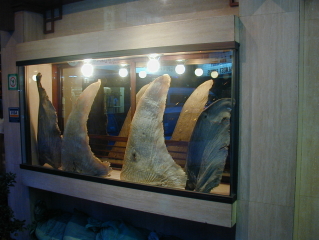zurück
Bangkok :

Haifischflossen Sharkfins
Shark fins
are a controversial delicacy in many parts of the world, particularly in East
and Southeast Asia, where they are used in dishes like
shark fin soup. The practice of
harvesting shark fins has significant environmental and ethical implications,
leading to global discussions and efforts to curb shark finning and its impact
on marine ecosystems.
Here’s a deeper look at
shark fins and the issues
surrounding them:
1.
Shark Finning and Shark Fin Soup
-
Shark Fin Soup: This is a traditional dish in Chinese cuisine,
often served at special occasions like weddings, banquets, and other
celebrations. The soup typically contains dried shark fins, which are prized
for their texture, believed to have health benefits such as improving skin
and enhancing energy.
-
Shark Finning: The process
of shark finning involves removing the fins from sharks, often while they
are still alive, and discarding the rest of the body back into the ocean.
This is particularly devastating to the shark population because the sharks,
without their fins, cannot swim properly, making them vulnerable to
predators and leading to death.
2.
Environmental Impact
-
Declining Shark Populations:
Sharks are a crucial part of marine ecosystems, and overfishing them for
their fins has caused a significant decline in shark populations worldwide.
Some species are now endangered due to excessive hunting for their fins.
-
Ecosystem Disruption:
Sharks play an important role in maintaining healthy marine ecosystems by
regulating the population of other marine species. When sharks are
overfished, it can lead to imbalances in marine life and negatively affect
the entire food chain.
-
Sustainability Issues:
Shark finning is often unsustainable, as it can lead to the depletion of
shark species faster than they can reproduce, creating long-term ecological
damage.
3.
Global Ban on Shark Finning
-
International Regulations:
In recent years, there has been growing awareness about the impact of shark
finning, and many countries have introduced laws and regulations to protect
shark species and ban the practice of shark finning.
-
The Convention on
International Trade in Endangered Species of Wild Fauna and Flora
(CITES) has included several shark species in its list of
protected animals.
-
Shark Fin Bans:
Several countries and regions, including
Hawaii,
California,
Australia, and parts
of Asia, have
implemented laws that prohibit the sale, trade, or possession of shark
fins.
-
Efforts to Combat the Trade:
Conservation organizations, such as
Wildlife Conservation Society
(WCS) and Shark Trust,
are actively working to reduce shark finning and promote sustainable seafood
practices.
4.
Ethical Considerations
-
Animal Cruelty: The
methods used to harvest shark fins are considered extremely cruel. Often,
sharks are caught, their fins removed, and the rest of the body is
discarded, leading to unnecessary suffering. In some cases, the sharks are
left to die slowly in the ocean.
-
Cultural Practices: While
shark fin soup has cultural significance, many argue that tradition should
not come at the cost of environmental sustainability and animal welfare. In
response, there has been growing support for alternatives to shark fins,
both within and outside of traditional cuisines.
5.
Alternatives to Shark Fins
-
Plant-based Alternatives:
In an effort to reduce the demand for real shark fins, several companies
have developed plant-based or
vegan shark fin substitutes made from ingredients like
seaweed,
mushrooms, or
agar-agar. These
alternatives mimic the texture of shark fins without harming the environment
or contributing to animal cruelty.
-
Awareness Campaigns: Many
restaurants, particularly in countries like Hong Kong, Taiwan, and China,
have begun to offer shark fin
alternatives on their menus and have pledged to stop serving shark
fin soup as a result of growing awareness about its harmful impact on marine
life.
6.
Conservation Efforts
-
Shark Protection Organizations:
Various conservation groups are actively working to protect shark
populations by lobbying for stricter regulations, educating the public about
the impact of shark finning, and promoting sustainable alternatives. Some
well-known organizations include:
-
Oceana
-
Sharksavers
-
The Shark Trust
-
Shark Sanctuaries:
Countries such as the Maldives,
Palau, and
The Bahamas have
designated their waters as shark
sanctuaries, where shark fishing and finning are banned, and shark
populations are protected.
7.
What You Can Do
-
Avoid Shark Fin Products:
One of the most effective ways to contribute to the protection of sharks is
by avoiding products containing shark fins, including shark fin soup.
-
Support Sustainable Seafood:
Look for certifications like the
Marine Stewardship Council (MSC) label, which indicates that the
seafood is sourced sustainably.
-
Spread Awareness: Help
raise awareness about the issue of shark finning by sharing information and
supporting organizations working to protect sharks and marine ecosystems.
The harvesting of shark fins for soup has a
significant and negative impact on marine life. However, as awareness grows and
more countries and regions implement protections, the hope is that the practice
will diminish, and the global shark population can recover. It’s essential to
think about sustainability and ethical concerns when it comes to seafood choices
and support efforts that protect marine ecosystems.
 26.07.25 Copyright Dirk
Rauschenbach Koelnerstrasse 293 51702 Bergneustadt
Datenschutzerklaerung 02261 9788972 Mail ccooly(
at) web.de
26.07.25 Copyright Dirk
Rauschenbach Koelnerstrasse 293 51702 Bergneustadt
Datenschutzerklaerung 02261 9788972 Mail ccooly(
at) web.de
 Safaris
Bergsteigen
Wandern
Inselwandern Weltweit
Safaris
Bergsteigen
Wandern
Inselwandern Weltweit
 Europa
Inselwandern
Europa
Inselwandern
 Städtewandern
Städtewandern
 Paintings
Paintings Dirk Rauschenbach
Dirk Rauschenbach
 Safaris
Bergsteigen
Wandern
Inselwandern Weltweit
Safaris
Bergsteigen
Wandern
Inselwandern Weltweit
 Europa
Inselwandern
Europa
Inselwandern
 Städtewandern
Städtewandern
 Paintings
Paintings Dirk Rauschenbach
Dirk Rauschenbach

![]() 26.07.25 Copyright Dirk
Rauschenbach Koelnerstrasse 293 51702 Bergneustadt
Datenschutzerklaerung 02261 9788972 Mail ccooly(
at) web.de
26.07.25 Copyright Dirk
Rauschenbach Koelnerstrasse 293 51702 Bergneustadt
Datenschutzerklaerung 02261 9788972 Mail ccooly(
at) web.de